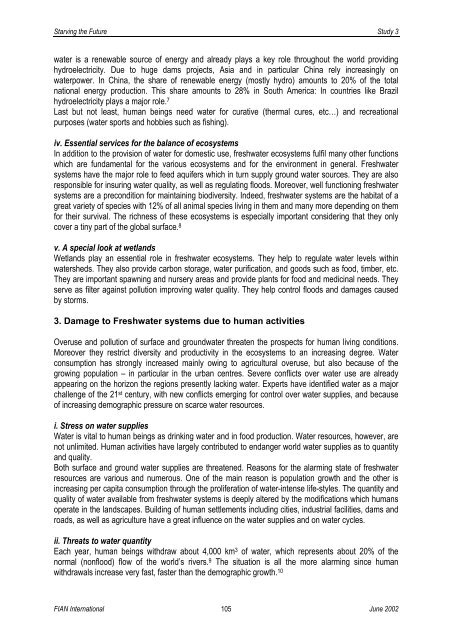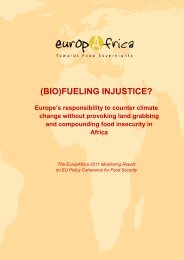Study 3: Ecodestruction and the Right to Food: The Cases of Water ...
Study 3: Ecodestruction and the Right to Food: The Cases of Water ...
Study 3: Ecodestruction and the Right to Food: The Cases of Water ...
Create successful ePaper yourself
Turn your PDF publications into a flip-book with our unique Google optimized e-Paper software.
Starving <strong>the</strong> Future <strong>Study</strong> 3<br />
water is a renewable source <strong>of</strong> energy <strong>and</strong> already plays a key role throughout <strong>the</strong> world providing<br />
hydroelectricity. Due <strong>to</strong> huge dams projects, Asia <strong>and</strong> in particular China rely increasingly on<br />
waterpower. In China, <strong>the</strong> share <strong>of</strong> renewable energy (mostly hydro) amounts <strong>to</strong> 20% <strong>of</strong> <strong>the</strong> <strong>to</strong>tal<br />
national energy production. This share amounts <strong>to</strong> 28% in South America: In countries like Brazil<br />
hydroelectricity plays a major role. 7<br />
Last but not least, human beings need water for curative (<strong>the</strong>rmal cures, etc…) <strong>and</strong> recreational<br />
purposes (water sports <strong>and</strong> hobbies such as fishing).<br />
iv. Essential services for <strong>the</strong> balance <strong>of</strong> ecosystems<br />
In addition <strong>to</strong> <strong>the</strong> provision <strong>of</strong> water for domestic use, freshwater ecosystems fulfil many o<strong>the</strong>r functions<br />
which are fundamental for <strong>the</strong> various ecosystems <strong>and</strong> for <strong>the</strong> environment in general. Freshwater<br />
systems have <strong>the</strong> major role <strong>to</strong> feed aquifers which in turn supply ground water sources. <strong>The</strong>y are also<br />
responsible for insuring water quality, as well as regulating floods. Moreover, well functioning freshwater<br />
systems are a precondition for maintaining biodiversity. Indeed, freshwater systems are <strong>the</strong> habitat <strong>of</strong> a<br />
great variety <strong>of</strong> species with 12% <strong>of</strong> all animal species living in <strong>the</strong>m <strong>and</strong> many more depending on <strong>the</strong>m<br />
for <strong>the</strong>ir survival. <strong>The</strong> richness <strong>of</strong> <strong>the</strong>se ecosystems is especially important considering that <strong>the</strong>y only<br />
cover a tiny part <strong>of</strong> <strong>the</strong> global surface. 8<br />
v. A special look at wetl<strong>and</strong>s<br />
Wetl<strong>and</strong>s play an essential role in freshwater ecosystems. <strong>The</strong>y help <strong>to</strong> regulate water levels within<br />
watersheds. <strong>The</strong>y also provide carbon s<strong>to</strong>rage, water purification, <strong>and</strong> goods such as food, timber, etc.<br />
<strong>The</strong>y are important spawning <strong>and</strong> nursery areas <strong>and</strong> provide plants for food <strong>and</strong> medicinal needs. <strong>The</strong>y<br />
serve as filter against pollution improving water quality. <strong>The</strong>y help control floods <strong>and</strong> damages caused<br />
by s<strong>to</strong>rms.<br />
3. Damage <strong>to</strong> Freshwater systems due <strong>to</strong> human activities<br />
Overuse <strong>and</strong> pollution <strong>of</strong> surface <strong>and</strong> groundwater threaten <strong>the</strong> prospects for human living conditions.<br />
Moreover <strong>the</strong>y restrict diversity <strong>and</strong> productivity in <strong>the</strong> ecosystems <strong>to</strong> an increasing degree. <strong>Water</strong><br />
consumption has strongly increased mainly owing <strong>to</strong> agricultural overuse, but also because <strong>of</strong> <strong>the</strong><br />
growing population – in particular in <strong>the</strong> urban centres. Severe conflicts over water use are already<br />
appearing on <strong>the</strong> horizon <strong>the</strong> regions presently lacking water. Experts have identified water as a major<br />
challenge <strong>of</strong> <strong>the</strong> 21 st century, with new conflicts emerging for control over water supplies, <strong>and</strong> because<br />
<strong>of</strong> increasing demographic pressure on scarce water resources.<br />
i. Stress on water supplies<br />
<strong>Water</strong> is vital <strong>to</strong> human beings as drinking water <strong>and</strong> in food production. <strong>Water</strong> resources, however, are<br />
not unlimited. Human activities have largely contributed <strong>to</strong> endanger world water supplies as <strong>to</strong> quantity<br />
<strong>and</strong> quality.<br />
Both surface <strong>and</strong> ground water supplies are threatened. Reasons for <strong>the</strong> alarming state <strong>of</strong> freshwater<br />
resources are various <strong>and</strong> numerous. One <strong>of</strong> <strong>the</strong> main reason is population growth <strong>and</strong> <strong>the</strong> o<strong>the</strong>r is<br />
increasing per capita consumption through <strong>the</strong> proliferation <strong>of</strong> water-intense life-styles. <strong>The</strong> quantity <strong>and</strong><br />
quality <strong>of</strong> water available from freshwater systems is deeply altered by <strong>the</strong> modifications which humans<br />
operate in <strong>the</strong> l<strong>and</strong>scapes. Building <strong>of</strong> human settlements including cities, industrial facilities, dams <strong>and</strong><br />
roads, as well as agriculture have a great influence on <strong>the</strong> water supplies <strong>and</strong> on water cycles.<br />
ii. Threats <strong>to</strong> water quantity<br />
Each year, human beings withdraw about 4,000 km 3 <strong>of</strong> water, which represents about 20% <strong>of</strong> <strong>the</strong><br />
normal (nonflood) flow <strong>of</strong> <strong>the</strong> world’s rivers. 9 <strong>The</strong> situation is all <strong>the</strong> more alarming since human<br />
withdrawals increase very fast, faster than <strong>the</strong> demographic growth. 10<br />
FIAN International 105<br />
June 2002
















